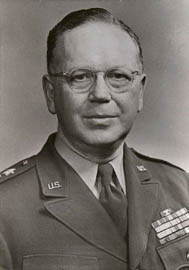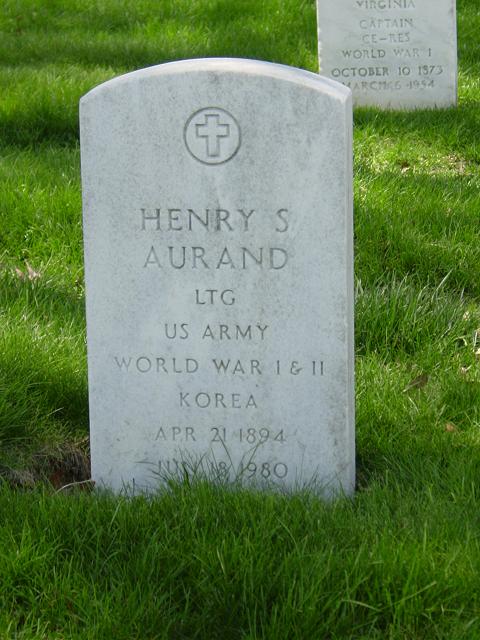Lieutenant General Henry S. Aurand commanded the U.S. Army, Pacific from April 1949 until his retirement in 1952 towards the end of the Korean War. Born in 1894 in Tamaqua, Pennsylvania, he graduated from West Point in 1915 and served in the Coastal Artillery. What distinguished Aurand’s career however was his work in the Ordnance Corps – work that still influences military logistics today.
In addition to attending the Army Ordnance School, Aurand attended the Command and Staff College, the Army War College, and the Army Industrial College. The latter experience was instrumental in developing him for the leading role he played in planning supply operations for the Allies in the Lend-Lease program prior to US involvement in World War II. He had to strike the proper balance so there would be adequate supplies with which to train the US military.
Aurand enjoyed several major commands because of his logistical expertise. During World War II he was Commanding General of the Sixth Service Command in Chicago. After US forces landed in France he became Commanding General for Normandy Base Section, overseeing critical supply missions during the Battle of the Bulge. After the war, he was the final Commanding General in the China Theater and the Africa-Middle East Theater in order to preside over retrograde operations to the States.
Additional major duty assignments for General Aurand included the Director for Research and Development for the War Department and Director of Logistics for the Department of the Army. Perhaps this quote from General Wade McManus best summarizes Aurand’s pioneering contribution to military logistics: “General Aurand was a skilled logistician who served as a catalyst in reforming the U.S. Army’s logistical systems. He was directly involved in many changes pertaining to logistics and ordnance. As early as 1935 he was developing logistics principles that sound familiar to modern Ordnance officers.”
General Aurand’s Hawaiian command was marked by the dedication of the National Cemetery of the Pacific, the deployment of the 5th RCT to Korea, and the establishment of the Hawaii Infantry Training Center. He received many decorations, among which are the Distinguished Service Medal, the Bronze Star Medal, the Mexican Service Medal, the World War I Victory Medal, the American Defense Medal, the American Campaign Medal, the Asian-Pacific Campaign Medal, the European-African-Middle Eastern Medal, and the World War II Victory Medal. He died in 1980.
1894, April 21 Born in Tamaqua, Pennsylvania
1911 Entered West Point Military Academy
1915 Graduated from West Point Military Academy
1915-1940 Variety of military assignments
1941 Defense Aid Director of the War Department
1942 Chief of the International Division, Army Service Forces
1942 Secretary of the Combined Production Board
1942 Commanding General of the Sixth Service Command in Chicago, Illinois
1944 Assistant Chief Ordnance Officer, European Theater of Operations
(ETOUSA) and Communications Zone (ComZ)
1944 Commanding General, Normandy Base Section, ComZ, ETOUSA
1945 Last Commanding General, United States Services of Supply, China Theater
(US SOS CT)
1946 Commanding General of the Sixth Service Command in Chicago, Illinois
1946 Last Commanding General, Africa-Middle East Theater
1946 Last Director of Research and Development, War Department
1947 Director of Logistics, Department of the Army
1949 Commanding General, United States Army, Pacific (CG USArPac)
1952 Retired from the Army
The papers of General Henry S. Aurand span the years 1873-1967. The bulk of the material was originated during his military career from 1915 to 1952.
Aurand’s specialty was military logistics–the science of moving, supplying, and quartering troops. The collection should therefore have special significance for research on logistical problems and management. However, because he had many different types of military assignments and his papers chronicle the many activities in which he was involved, the collection could be useful for studies of such diverse topics as: the state of the United States military forces between the two World Wars; the training and education of professional soldiers; Lend Lease; German prisoners of war; the use of black troops during World War II and their subsequent integration into the armed forces; conditions in China during and immediately after World War II, and problems in closing out the China Therafter; disposal of military supplies in the Middle East; research and weapons development; universal military training; the North Atlantic Treaty
Organization; and, certain foreign policy matters.
As a consequence of the many positions which he held, General Aurand corresponded with several prominent individuals. His papers include messages to and from such people as Franklin Roosevelt, Henry Stimson, Averell Harriman, Robert Patterson, Kenneth Royall, Bernard Baruch, Harry Hopkins, and Generals Dwight D. Eisenhower, Omar Bradley, Floyd Parks. J. Lawton Collins, and Lucius Clay.
General Aurand was a prolific author and speaker both during and after his military career. The many articles, speech drafts, and newspaper columns found in the Aurand Papers frequently reflect his thinking and attitudes concerning numerous topics.
A key to expeditious research in the Aurand collection is a proper understanding of the broad chronological arrangement the General used in preserving most of his papers. For example, the material concerning his military career is arranged according to the succession of assignments he held while in the Army. Such arrangement necessitated the placement of similar folder and subject titles in separate segments of the collection.
It should be noted that the series pertaining to General Aurand s military career is divided into two subseries, each having its own chronological arrangement. The first segment concerns the non-educatinal military assignments, and the second group is related to his educational assignments with the Army from 1911 to 1940.
AURAND, HENRY S
- Lieutenant General, United States Army
- DATE OF BIRTH: 04/21/1894
- DATE OF DEATH: 06/18/1980
- BURIED AT: SECTION 11 SITE 813-2
ARLINGTON NATIONAL CEMETERY
AURAND, ELIZABETH STEELE
- DATE OF BIRTH: 02/05/1898
- DATE OF DEATH: 06/26/1983
- BURIED AT: SECTION 11 SITE 813-2
ARLINGTON NATIONAL CEMETERY - WIFE OF HS AURAND, LT GEN, USA
Michael Robert Patterson was born in Arlington and is the son of a former officer of the US Army. So it was no wonder that sooner or later his interests drew him to American history and especially to American military history. Many of his articles can be found on renowned portals like the New York Times, Washingtonpost or Wikipedia.
Reviewed by: Michael Howard


